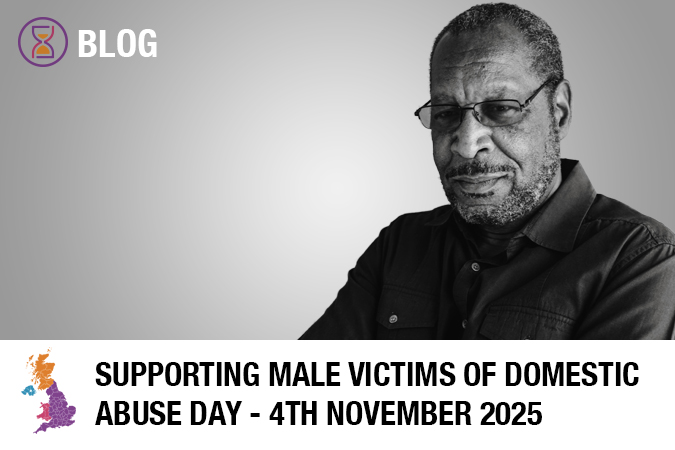
The abuse of male victim-survivors is hugely under recognised, underreported, under theorised, and under detected.
Older men in particular have typically been excluded from data collection or studies on victim-survivors of domestic and sexual abuse, from specialist policies, specialist support, and ultimately from understanding, empathy, and care.
Looking at abuse from our 2024/25 Helpline data, domestic abuse was the most commonly seen abuse type with male victim-survivors, closely followed by economic abuse, and coercive control. In most cases, the male victim-survivors intimate partner was the primary perpetrator of abuse, though sons as perpetrators closely followed this. Age dynamics varied too, with a plurality of cases illustrating abuse that affected men aged 75-84.
Stereotypes about power, gender, and the victim/perpetrator dynamic may stop older and all male victims for seeking help when suffering domestic abuse, with many men reporting that the most significant barrier to help-seeking is the fear of not being taken seriously, or not being believed, or being seen to be the perpetrator of violence.
While older men do not report abuse for many of the same reasons as older women, such as shame and stigma, within this there are also gender specific factors; namely the social construction of manhood, and notions of cultural stoicism/internalised sexism which say to men they must not show fear, or other perceived “weak” or “soft” emotions. For GBT male victims, both young and older, layers of stereotyping and prejudice add even more complexity to help seeking, with cultural heterosexist and homophobic attitudes adding an additional barrier.
Older male victims of abuse suffer from an invisibility of help and support needs. As with all older victims, older male victims are not usually seen in support literature or through signposting and there are a lack of effective intervention facilities and specialist support services for all male victims. While older female victims have options to go to safe female spaces (even if not suitable), these spaces either are closed to older male victims or do not exist
Male victims additionally undergo intense physical, psychological, and mental health effects from abuse and violence
Depression, post-traumatic stress, anxiety and their behavioural consequences, such as social isolation, substance mis-use and self-harm (in its broadest sense), are common outcomes of such abuse. Potentially as a link to the lack of support structures, 11% of all male victims (7.2% of women) consider taking their life due to domestic abuse.
Specialist support and attention is sorely needed to support older male victims. Hourglass believes that specialist IDVA/ISVA and refuge support for older male victims, as well as gender inclusive training for support practitioners is urgently required. As well as this, there is a fundamental problem with placing violence against men and boys within the wider VAWG banner, it is imperative that a separate strategy focused on violence against men and boys be instituted.
Today, the 4th November is Supporting Male Victims of Domestic Abuse Day 2025 which is a collective and coordinated campaign by organisations supporting men across the UK, and Hourglass seeks to encourage older male victim-survivors to come forward if you’re suffering from abuse, violence, or neglect. If you are a male aged 60 or above, living in the UK, we can help you. Don’t suffer alone or in silence.
 Shop Now
Shop Now